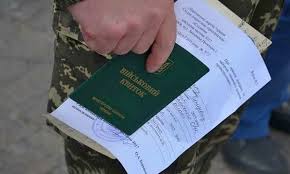Judicial procedure for appealing decisions of the VLK.
In addition to the pre-trial procedure, the decisions of the VLK can be challenged in court in accordance with the requirements of the Code of Administrative Procedure of Ukraine (hereinafter referred to as the Administrative Procedure Code of Ukraine). Appeals against the decisions of the VLK in court are carried out in the order of administrative proceedings, since the VLK are bodies of military administration that perform authoritative management functions.
The terms for appeal are regulated by Article 122 of the CAS:
1. Three months from the date of delivery of the relevant decision based on the results of the review of the application to challenge the resolution, i.e. in the case of preliminary application of the pre-trial procedure. This term begins to run from the day of delivery of the decision of the higher instance of the VLK based on the results of consideration of the application for revision of the resolution.
2. Six months from the day when the person learned or should have learned about the violation of his rights, freedoms or interests, i.e. from the day the relevant decision of the Supreme Administrative Court was issued.
The size of the court fee for submitting an application to the court by an individual is 0.4 of the subsistence minimum for able-bodied persons. In 2024, it amounts to UAH 1,211.20.
The requirements for the statement of claim and the necessary annexes are submitted taking into account the requirements of Articles 160 and 161 of the Civil Code. In particular, the statement of claim must contain:
• name of the administrative court to which the application is submitted;
• full name of the parties and their location (place of residence);
• content of the disputed decision (resolution of the VLK);
• a statement of the circumstances on which the requirements are based;
• claims of the plaintiff and their justification;
• a list of documents attached to the application.Copies of the disputed resolution of the VLK and documents confirming the circumstances on which the claims are based (for example, medical reports, certificates, etc.) must be attached to the application.
You may be interested in the following articles: Appeal of the MMC decision through the courts appeal of the conclusion of the military medical commission appeal of the decision of the military medical commission appeal of the decision of the military medical commission sample
Judicial practice
In its practice, the Supreme Court has developed a number of important positions regarding appeals against resolutions of military medical commissions. In particular, in the decision of June 12, 2020 in case No. 810/5009/18, the Supreme Court expressed the following key provisions:
1. Judicial control over the decisions of the VLK is carried out within the competence of administrative courts. The court cannot replace the VLK and independently determine the degree of fitness for military service, but it has the right to assess the completeness and objectivity of the conducted medical examination and establish the causal relationship of the disease.
2. The court is obliged to verify compliance with the procedure for conducting a medical examination and making a decision of the VLC, as well as to analyze the availability of all the necessary documents on the basis of which the decision was made.
3. If the court finds deficiencies in the procedure for conducting a medical examination or making a decision of the VLK, the decision of the VLK may be declared illegal and canceled with the obligation to conduct a second medical examination.
4. The court does not have the right to independently establish the causal relationship between the illness and military service or to determine the degree of disability. This belongs to the competence of the VLK.
It should be emphasized that the judicial practice regarding the appeal of the decisions of the VLK is quite contradictory.
For example, an analysis of two court decisions in cases No. 420/5300/23 and No. 480/6410/23 is useful for clarifying the legal approaches to appealing the decisions of the VLK.
In case No. 420/5300/23, the Odesa District Administrative Court refused to satisfy the claim for recognition as illegal and annulment of the decision of the military medical commission of the Military Medical Clinical Center of the Southern Region, which declared the plaintiff fit for military service. The court justified its position with the following key reasons:
1. The decision of the garrison VLK, which issued the plaintiff a certificate of suitability, was adopted by the appropriate competent commission in accordance with the procedure established by law in accordance with the requirements of Regulation No. 402. The court has no grounds to question the legality of the creation and operation of this VLK.
2. The court does not have the special medical knowledge necessary to evaluate the conclusions of the VLK about the claimant's state of health and his fitness for military service, as this is a purely medical issue. The resolution of such issues belongs to the discretionary powers of professional military medical commissions and specialized expert medical institutions.
1. The law provides for the possibility of appealing the decision of the VLK to a higher level VLK or directly to the Central Military Medical Commission. It is these bodies of the military medical examination that are empowered to review the conclusions of the previous VLK in substance, taking into account additional data and the results of the plaintiff's medical examinations.Instead, in case No. 480/6410/23, the Sumy District Administrative Court satisfied the claim and found it illegal and annulled the decision of the Military Medical Commission at the Sumy City Territorial Center of Recruitment and Social Support declaring the plaintiff unfit for military service. The court based its decision on the following considerations:
1) During the medical examination of the plaintiff by members of the VLK, the procedure established by Regulation No. 402 was not followed. In particular, the plaintiff's medical card does not contain the results of mandatory examinations - X-ray, blood and urine tests, electrocardiogram, etc., which indicates an incomplete medical examination and a violation of the requirements of the law.
2) The controversial decision of the VLK about the plaintiff's unfitness for military service was made unfounded, without taking into account all available case materials and circumstances. It is disproportionate to the possible restriction of individual rights and does not ensure a proper balance of private and public interests. The defendant (VLK) did not prove the legality of his decision.
3) Although the issue of determining suitability for military service is a discretionary authority of the VLK, however, since the contested decision was made in violation of the procedure established by law, it is subject to cancellation by the court.
4) The court emphasized that it does not have the competence to assess the correctness of the medical conclusions of the VLK regarding the diagnosis and degree of suitability of a person for military service. However, the court is authorized to check the legality of the decision of the VLK itself in terms of compliance with the established procedure for its adoption.





























